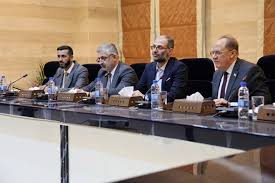In recent months, religion has made a noticeable resurgence in Syrian public life. Its presence is visible everywhere—from the way people dress and speak to the symbols and slogans that fill the streets. For some Syrians, this is a natural reflection of the country’s Sunni majority. Others interpret it as a response to years of suppression under the previous regime, or as a direction subtly encouraged by the current authorities. Whatever the cause, Syria is clearly undergoing a profound transformation of national identity.
This shift has now sparked debate over the appropriate role of religion within the state—particularly following reports that the President’s religious adviser took part in a committee interviewing candidates for senior government posts, including the presidency of Damascus University.
The public reaction was swift—and sharply divided.
One camp welcomed the adviser’s involvement, arguing that it ensures the selection of morally upright individuals for leadership positions. To them, religious values offer an essential ethical compass for a nation still recovering from the scars of war and systemic corruption.
The opposing view expressed deep concern. Critics questioned the qualifications of a religious adviser in assessing candidates for academic or administrative leadership roles. Why, they asked, should someone with no expertise in higher education help determine who leads one of Syria’s most prestigious universities? For many, the move felt uncomfortably reminiscent of an era when Ba’ath Party loyalists dominated such appointments—albeit now under a different ideological banner.
This is not a mere symbolic matter. In Syria, a university president wields authority comparable to that of a cabinet minister. Such appointments not only shape educational policy but also influence the country’s international standing. If these decisions hinge on religious affiliation rather than professional merit, the quality and credibility of Syria’s institutions may suffer.
Legally speaking, there is nothing unusual about a president or minister assigning any adviser to a committee. Yet the real issue lies beyond legality. It is one of perception, public trust, and whether Syria’s new leadership truly intends to break with the legacy of patronage and politicised governance.
For over five decades, public appointments in Syria were frequently determined by personal connections, bribery, political allegiance, or security clearance. Merit was rarely the deciding factor. Many Syrians hoped that, following the fall of the Assad regime, this pattern would give way to fairness, transparency, and professionalism.
That hope, however, remains unfulfilled.
What Syria urgently needs is a clear, merit-based system for appointing public officials. Committees should be composed of domain experts rather than symbolic figures. Candidates ought to be judged on their experience, qualifications, and vision—not their religious background or revolutionary credentials.
There is nothing inherently wrong with allowing moral values to inform public service. But when clerics begin to influence core administrative decisions—particularly in the realm of education—it raises serious questions about the trajectory of governance in Syria.
This debate is not about marginalising religion. It is about constructing a state in which all citizens—regardless of belief—can have confidence that public institutions are led by the most competent individuals. Syria stands at a crossroads. Progress requires a clear distinction between the moral legitimacy of the revolution and the practical demands of building an effective, modern state.
Should that line remain blurred, Syria risks repeating the very mistakes that once brought it to the brink.
This article was translated and edited by The Syrian Observer. The Syrian Observer has not verified the content of this story. Responsibility for the information and views set out in this article lies entirely with the author.


